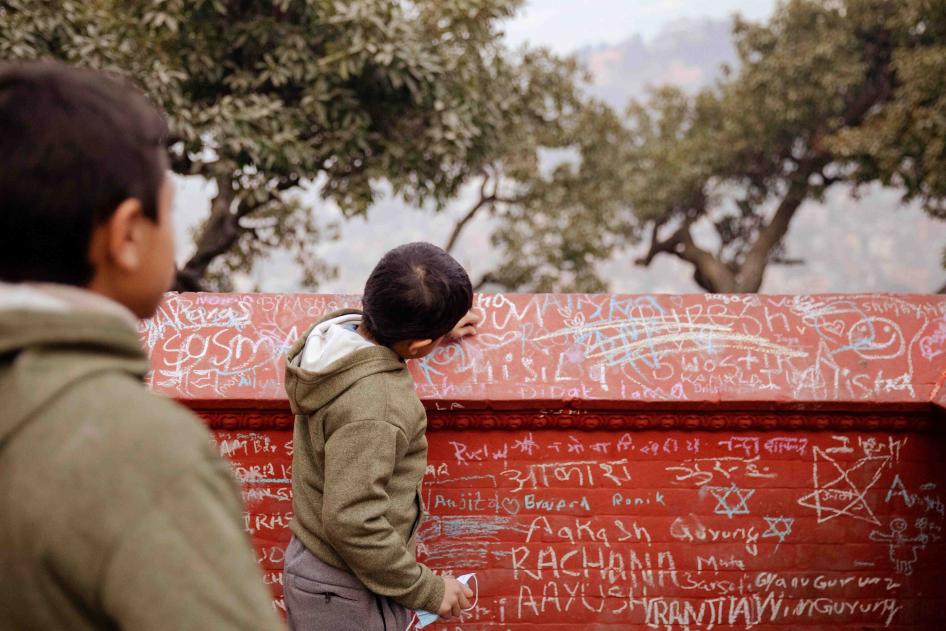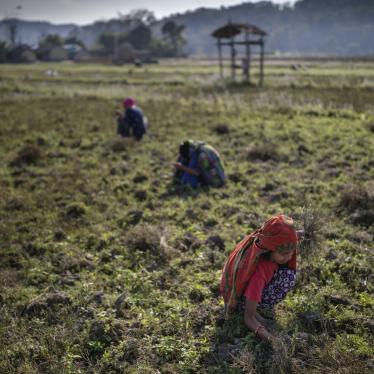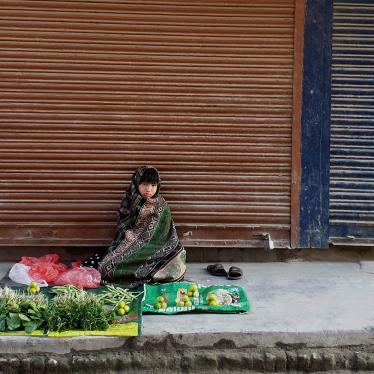(Kathmandu) – The Nepali government should expand the Child Grant program to all families in the forthcoming budget as a crucial step toward ensuring the right of all children to an adequate standard of living, 16 Nepali and international civil society and human rights organizations said today in an open letter to Finance Minister Prakash Sharan Mahat. Most children in Nepal are not covered by social security even though it is the bedrock of economic justice, critical to address inequality, and helps achieve various rights.
“Nepal has an opportunity to develop world-leading social policies that fulfill human rights by reducing inequality and poverty, and to build a more just economy,” said Lena Simet, senior economic justice researcher at Human Rights Watch. “With 40 percent of the population under the age of 18, investing in social security for children is more important than ever for Nepal to ensure their rights and the country’s future prosperity.”
On May 29, Finance Minister Prakash Sharan Mahat is scheduled to present the annual budget plan for fiscal year 2023-24. The budget drafting committee, currently defining next year’s spending parameters, should consider increasing provisions for the Child Grant, a federal government program introduced in 2009 in five districts of the Karnali region, with a commitment to roll it out nationwide by 2025. Currently, the Child Grant covers about 40 percent of children under age 5 but just 9.5 percent of all children in the country. Benefit levels are set at NPR 532 (US$4) per month per child.
Despite the low benefit amounts, studies by the United Nations and academics have found that the Child Grant has had a range of positive effects. It has increased birth registration rates and enabled families to buy food and clothes, and pay for other essential expenses. It has lowered the likelihood of child labor. It also enhanced the public's perception of the government, with beneficiaries perceiving the government as caring about their well-being.
“Many Nepali children have to work to help their families make ends meet,” said Sumnima Tuladhar, general secretary of Child Workers in Nepal Concerned Centre (CWIN). “They drop out of school and often remain trapped in low earning jobs, which feeds into deep-seated intergenerational inequality. Providing the Child Grant to all families in Nepal is one step in breaking this unjust inequality cycle.”
A crucial feature of the Child Grant is that in the 25 districts where it is provided, it is designed to be a universal program to which all Nepali children are entitled. A 2021 UNICEF study found that providing a universal child benefit to all children up to the age of 17 by 2035 is feasible for Nepal’s government, costing less than 0.7 percent of GDP a year.
While budget allocations to social security in Nepal increased in the years preceding the Covid-19 pandemic, more than two-thirds were due to retirement benefits to civil servants, suggesting the spike did not benefit the wider population. In 2020, only 4.1 percent of the social security budget was slotted for children. A recent Human Rights Watch report found that children and informal workers are largely invisible to Nepal’s social security system, reinforcing inequalities.
Poverty and inequality are high in Nepal and increased with the Covid-19 pandemic. A 2019 study by Oxfam International and Humanitarian Accountability Monitoring Initiative (HAMI), a Nepali nongovernmental organization, found income and wealth inequality to be among the highest in the world. Discrimination against women, corruption, low investment in public services, and a regressive tax system were key drivers of inequality.
In 2022, a UNICEF survey found that 20 percent of families were struggling daily to get sufficient food, and that 7 percent had reduced food for their children. Expanding the Child Grant to all families in Nepal would be an important step in addressing prevailing economic struggles and the country’s high inequality, the organizations said.
Social security is a human right enshrined in various treaties ratified by Nepal, including the International Covenant on Economic, Social and Cultural Rights and the Convention on the Rights of the Child. The right to social security is also recognized in article 43 of the Nepali Constitution. It plays an important role in realizing a range of other rights, including the rights to education, food, health care, and housing.
“Nepal’s Child Grant is a proven government social security program with profound benefits for children,” said Tilottam Paudel, president of the Social Protection Civil Society Network. “In the forthcoming budget, the government should expand the program as a step toward universal coverage of all children in Nepal. Millions of children and their families would benefit, and so would the entire country.”









